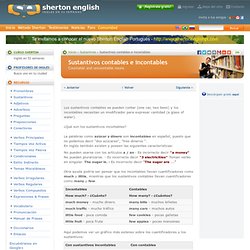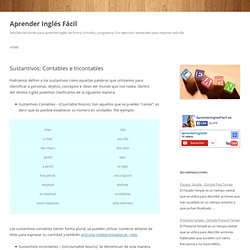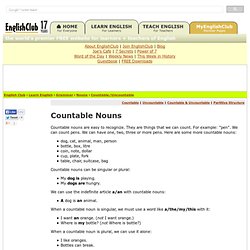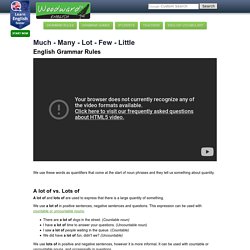

Sustantivos contables e incontables en inglés. If you can't see the Babylon translation box, use this link for <a href=" or this one for <a href=" Descárgalo gratis aquí Los sustantivos contables se pueden contar (one car, two bees) y los incontables necesitan un modificador para expresar cantidad (a glass of water).

¿Qué son los sustantivos incontables? La palabras como azúcar y dinero son incontables en español, puesto que no podemos decir "dos azúcares", "tres dineros ". En inglés también existen y poseen las siguientes características: No pueden usarse con los artículos a / an - Es incorrecto decir "a money" No pueden pluralizarse. - Es incorrecto decir "3 electricities" Toman verbo en singular.
Otra ayuda podría ser pensar que los incontables llevan cuantificadores como much y little, mientras que los sustantivos contables llevan cuantificadores como many y few. Aquí podemos ver un gráfico más extenso sobre los cuantificadores y los sustantivos: Aquí hay una lista de los sustantivos incontables más comunes: Sustantivos contables e incontables: a/an y the. Sustantivos contables e incontables (2) there is/are, some/any, much. Sustantivos: Contables e Incontables. Podríamos definir a los sustantivos como aquellas palabras que utilizamos para identificar a personas, objetos, conceptos e ideas del mundo que nos rodea.

Dentro del idioma inglés podemos clasificarlos de la siguiente manera: Sustantivos Contables – (Countable Nouns): Son aquellos que se pueden “contar”, es decir que es posible establecer su número en unidades. Por ejemplo: Los sustantivos contables tienen forma plural, se pueden utilizar números delante de ellos para expresar su cantidad y también artículos indeterminados (A – AN).Sustantivos Incontables – (Uncountable Nouns): Se denominan de esta manera aquellos sustantivos que no se puede determinar su número en unidades.
Por ejemplo: En algunos de estos casos es posible contarlos si se toma como referenciael envase del producto, por ejemplo: En el caso de los sustantivos incontables no se puede formar el plural, ya que no es posible decir “harinas”, “leches”, etc. Countable Nouns. Countable nouns are easy to recognize.

They are things that we can count. For example: "pen". We can count pens. We can have one, two, three or more pens. Here are some more countable nouns: dog, cat, animal, man, personbottle, box, litrecoin, note, dollarcup, plate, forktable, chair, suitcase, bag Countable nouns can be singular or plural: My dog is playing.My dogs are hungry. We can use the indefinite article a/an with countable nouns: A dog is an animal. When a countable noun is singular, we must use a word like a/the/my/this with it: I want an orange. When a countable noun is plural, we can use it alone: I like oranges.Bottles can break. We can use some and any with countable nouns: I've got some dollars.Have you got any pens? We can use a few and many with countable nouns: I've got a few dollars.I haven't got many pens.
"People" is countable. Uncountable Nouns » Formation of comparative and superlative adjectives – advanced points. Much or many, a little or a few. Much Many Lot Few Little Difference Quantifiers Grammar Rules. We use these words as quantifiers that come at the start of noun phrases and they tell us something about quantity.

A lot of vs. Lots of A lot of and lots of are used to express that there is a large quantity of something. We use a lot of in positive sentences, negative sentences and questions. This expression can be used with countable or uncountable nouns. There are a lot of dogs in the street. We use lots of in positive and negative sentences, however it is more informal. We have lots of time to catch the plane, let's relax. She has a lot of money = She has lots of money Much vs. Much and Many are used to express that there is a large quantity of something. Much and Many are used in negative sentences and questions. I don't have many CDs in my collection. Note: we almost never use Much and Many in positive sentences, we almost always use a lot of or lots of. I have much money. With the word "times" we use many times more than a lot of times / lots of times. That is my favourite book. Grammar Lesson - A Little and a Few. Much, many, little and few.